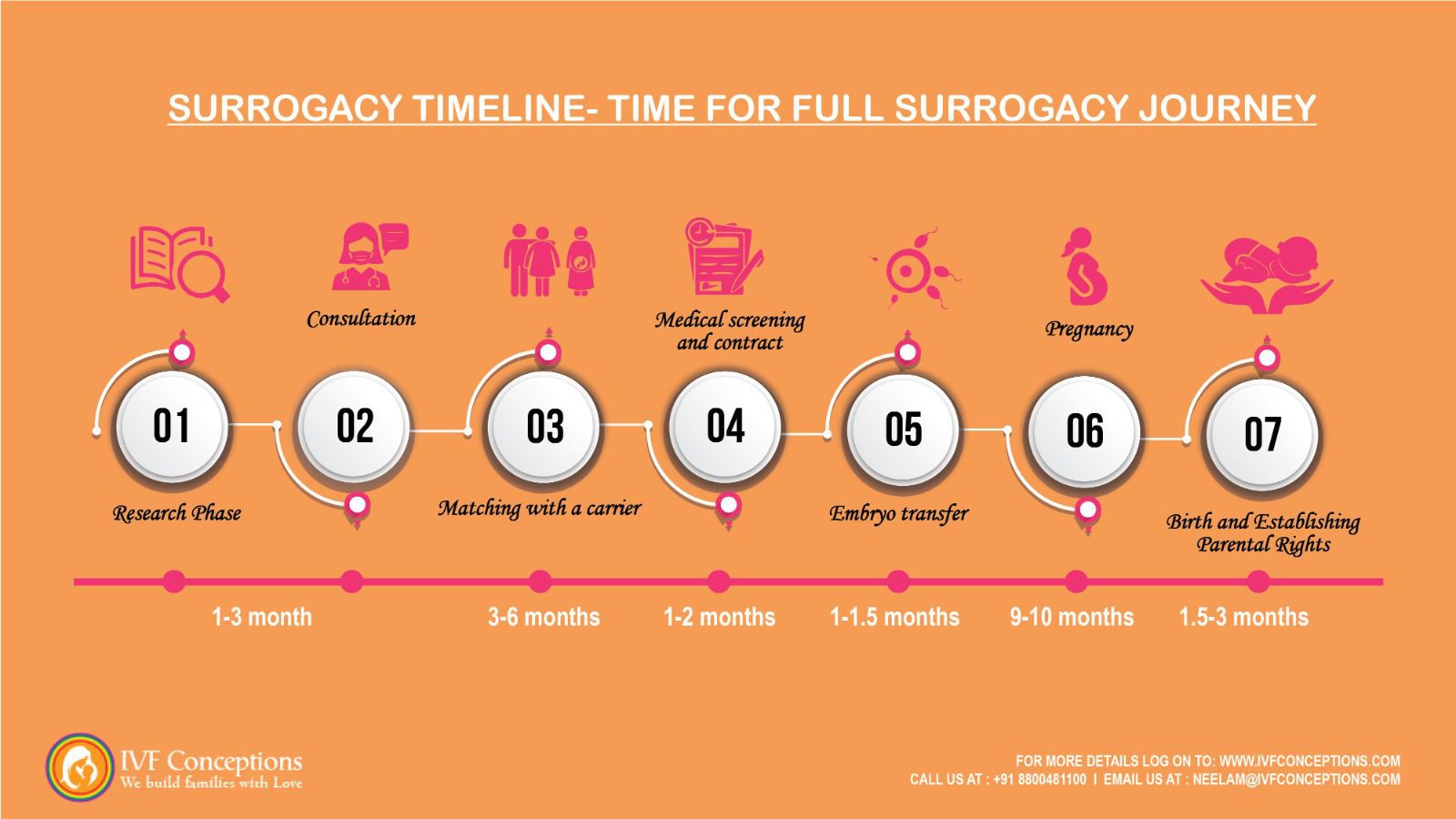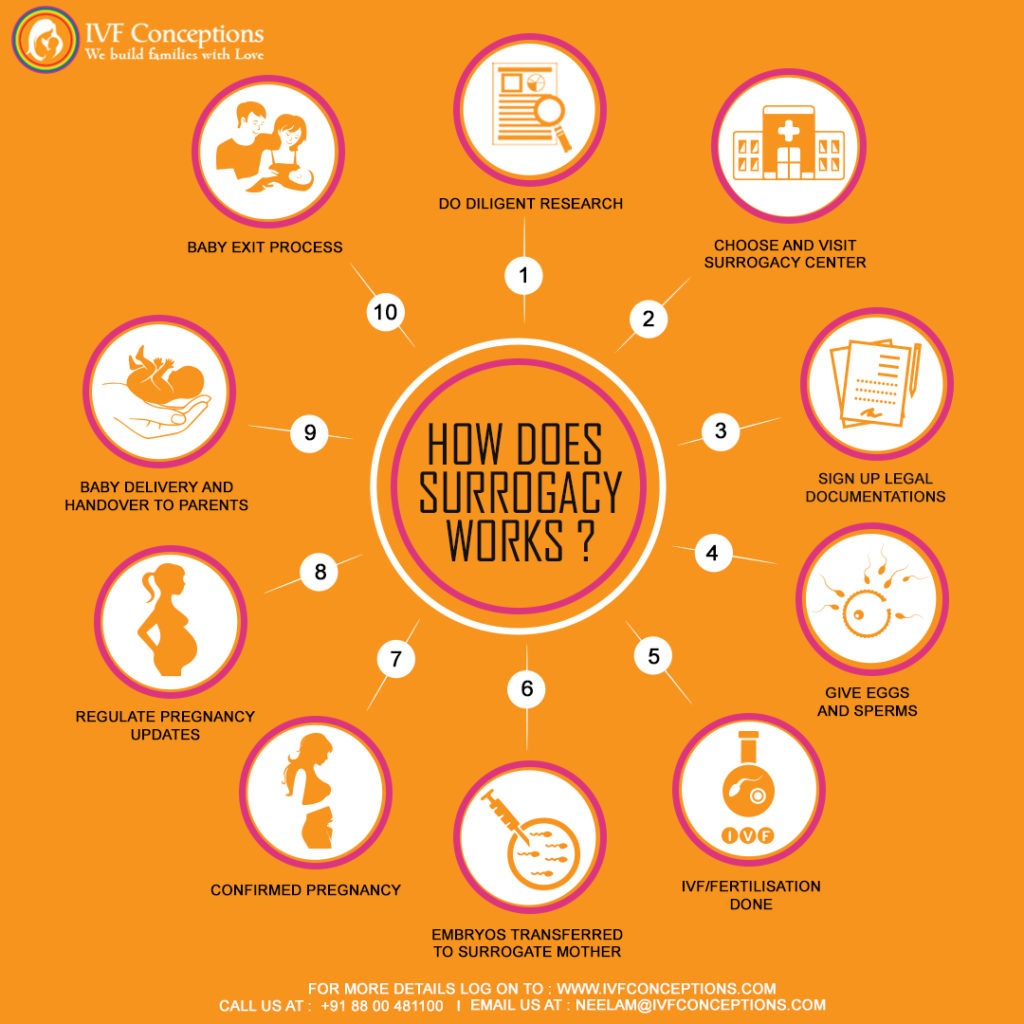How Does the Surrogate Mother Process Work? A Step-by-Step Guide


Surrogacy offers a unique path to parenthood for individuals or couples who cannot conceive or carry a pregnancy to term. Understanding the surrogate mother process is crucial for intended parents, as it involves multiple medical, legal, and emotional steps. This blog post provides a comprehensive guide on how the surrogate mother process works, including the various phases involved, from finding a surrogate to bringing home your baby.
In this guide, we will take you through every step of the surrogacy process, ensuring you have a clear understanding of what to expect and how we can make your dreams of parenthood a reality. So, dive into how the surrogate mother process works.
Get in touch for a Free Surrogacy Consultancy:
📲 +91-8800481100 ( WhatsApp, Line, Viber)
What Is Surrogacy?
Surrogacy is an arrangement in which a woman (the surrogate) carries a child for another person or couple (intended parents). There are two main types of surrogacy:
- Traditional Surrogacy: The surrogate is inseminated with sperm from the intended father or a donor, and her own egg is used. In this case, the surrogate has a genetic link to the baby.
- Gestational Surrogacy: The surrogate carries an embryo created via IVF (in vitro fertilization) using the egg of the intended mother (or an egg donor) and the sperm of the intended father (or a sperm donor). The gestational surrogate has no genetic connection to the baby.
Gestational surrogacy is the most common form of surrogacy today because it ensures that the intended parents (or their donors) are the only biological contributors.


How does the surrogate mother process work- Step-by-step Surrogacy Process
Here is a step-by-step surrogacy process for a surrogate mother
#1. Pre-Screening: Your First Step Towards Surrogacy
The surrogacy journey begins with a thoughtful and thorough pre-screening process. At IVF Conceptions, we believe that every surrogate mother is unique, and it’s essential to ensure that surrogacy is the right path for you. Here’s what you can expect during this phase:
- Surrogate Application
The first step is completing our surrogate application. This user-friendly application takes just about 10 minutes to fill out. You’ll provide us with your personal information, health and pregnancy history, financial details, and information about your support network.
- Evaluation and Background Checks
Once we receive your application, our dedicated team will review it promptly. If you are approved, a Surrogate Advisor will reach out to you within 24 hours. We’ll also request and review your medical records during this phase.
- Surrogate Portal Access
Upon approval, you’ll gain access to our Surrogate Portal, where you’ll find valuable resources and support throughout your journey. Your Surrogate Advisor will work closely with you to ensure a seamless experience.
#2. Consultation: Connecting with Your Surrogacy Team
Your surrogacy consultation is a crucial step in the process, allowing us to get to know you better and address any questions or concerns you may have. Here’s what you can expect during this phase:
- Video Call with a Social Worker
During the consultation, you’ll have an in-depth video interview with one of our experienced social workers. This interview typically lasts around 2 to 2 ½ hours and covers various aspects of your motivation to become a surrogate, your support system, pregnancy history, family, and more.
- Compensation for Your Time
We understand that the consultation may require some time out of your day. As a token of appreciation, all surrogate applicants who complete this phase will receive a $500 advancement from their base fee after being matched, compensating for any lost wages and childcare arrangements.
- Primary Support Person
Every surrogate mother is required to have a Primary Support Person with them on this journey. This support person plays a crucial role in accompanying you to appointments, offering emotional support, and being there for you every step of the way.

 #3. Matching: Finding the Perfect Fit
#3. Matching: Finding the Perfect Fit
Matching is an exciting phase where you’ll be introduced to the intended parents you’ll be assisting. Here’s how the matching process works:
- Profile Exchange
Our Matching Specialists will work closely with you to find the ideal parent match. You’ll exchange profiles with the intended parents, allowing both parties to learn more about each other and their surrogacy journey.
- Video Call with Intended Parents
If both parties are interested, a video call can be arranged for you to get to know each other better. This call is a unique opportunity to discuss your expectations, hopes, and dreams for the surrogacy journey.
- The Joy of Matching
Once the call concludes, and if both parties feel a connection, you’re officially matched! This is a significant milestone in your surrogacy journey.
#4. Medical Screening & Legal Contracts: Ensuring a Healthy Start
As you progress, medical screening and legal contracts become essential components. Here’s what you need to know:
- Medical Screening
Your first physical interaction with the intended parents often occurs during the medical screening at the IVF clinic. This involves a physical exam, sonogram, blood tests, and discussions about medications. It’s a pivotal moment in building a closer relationship with the intended parents.
- Legal Contracts
Legal contracts will be negotiated and finalized with an attorney to ensure all parties’ rights and responsibilities are clearly defined. This step usually takes 2 to 3 months.
#5. Monitoring Appointments & Embryo Transfer: The Path to Pregnancy
This phase involves attending local monitoring appointments and the crucial embryo transfer process:
- Monitoring Appointments
You’ll begin your surrogate medications and attend local monitoring appointments, ensuring that your body is responding correctly to the fertility medication.
- Embryo Transfer
The embryo transfer will require travel to the Intended Parents’ IVF clinic. It’s a brief process, and you’ll receive instructions from the IVF doctor.

 #6. Pregnancy: A Journey of Love and Support
#6. Pregnancy: A Journey of Love and Support
The pregnancy phase involves various medical checks and continued bonding with the intended parents:
- Beta Tests and Ultrasound
You’ll have beta tests to confirm the pregnancy’s progress and an ultrasound at around 6-7 weeks to confirm the heartbeat(s).
- Routine Appointments
Starting around week 10, you’ll begin routine appointments with your OBGYN, and it’s an excellent time to strengthen your relationship with the intended parents.
#7. Delivery Day: A Beautiful Beginning
As the journey nears its conclusion, preparations for delivery become essential:
- Birth Plan
You and the intended parents will work on a birth plan that outlines various aspects, such as who will attend the birth, who will be in the delivery room and other preferences.
- Saying Goodbye
Saying goodbye to the baby you’ve carried is undoubtedly emotional, but it’s also a beautiful moment of fulfillment. Many surrogates maintain a lasting relationship with the intended parents, continuing to support their surrogate baby’s growth.
More resources:
How to choose Surrogacy agencies
Surrogate mother qualifications
International surrogacy countries
Cheapest country for surrogacy
Surrogacy Timeline
The entire surrogacy journey can take anywhere from 12 to 24 months, depending on factors like finding the right surrogate, completing legal contracts, and undergoing medical treatments. Here’s a rough breakdown of the timeline:
| Surrogacy Step | Estimated Time |
| Decision and agency selection | 1-2 months |
| Matching with a surrogate | 3-6 months |
| Legal contracts | 1-2 months |
| IVF and embryo transfer | 1-2 months |
| Pregnancy and monitoring | 9 months |
| Delivery and post-birth legal work | 1 month |

 Costs Associated with Surrogacy
Costs Associated with Surrogacy
Surrogacy can be expensive due to the medical, legal, and agency fees involved. Costs vary depending on the country, surrogate compensation, and other factors. On average, surrogacy in the United States can range from $90,000 to $150,000, while surrogacy abroad (e.g., Mexico, Ukraine, or Georgia) may cost significantly less. These costs typically include:
- IVF and medical fees
- Surrogate compensation
- Legal fees
- Agency fees
- Insurance
- Travel and accommodation (for international surrogacy)
Key Considerations Before Starting Surrogacy
- Emotional Preparedness: Surrogacy is an emotionally charged journey for all parties involved. Counseling and open communication can help.
- Financial Planning: Surrogacy is a significant financial commitment. Having a clear budget and understanding the costs involved is essential.
- Legal Aspects: Surrogacy laws vary widely by country and state, so it’s important to ensure that you have solid legal backing throughout the process.
Conclusion
Surrogate mothers are the real heroes of any surrogacy process. It is due to their kindness and desire to help others, make any surrogacy journey is successful.
The surrogacy process is a complex yet rewarding path to parenthood for many families. With the help of experienced agencies, legal professionals, and fertility clinics, intended parents can navigate the process confidently and successfully.
By understanding each step—from finding a surrogate to the delivery of the baby—intended parents can better prepare for the surrogacy journey and make informed decisions along the way.
If you’d like to learn more about IVF, Egg Donation, or surrogacy services globally, check out the rest of our website at IVF Conceptions. We offer legally secure and affordable surrogacy consulting services to build families for free.
Get in touch for a Free Surrogacy Consultancy:
📲 +91-8800481100 ( WhatsApp, Line, Viber)


FAQs For How Does the Surrogate Mother Process Work?
What is surrogacy?
Surrogacy is an arrangement where a woman carries and gives birth to a child for another person or couple, who will become the child’s legal parents.
How does the surrogate selection process happen?
The surrogate selection process involves matching intended parents with a suitable surrogate based on compatibility, medical assessments, and legal agreements.
Are there different types of surrogacy?
Yes, there are two main types of surrogacy: traditional surrogacy (using the surrogate’s own egg) and gestational surrogacy (using the intended mother’s or donor’s egg).
What are the legal aspects of surrogacy?
Legal aspects of surrogacy vary by location but typically involve contracts, parental rights, and regulations to protect all parties involved.
How is a surrogate mother compensated?
Surrogate mothers are compensated for their time, effort, and potential risks, but compensation varies widely and may include medical expenses.
Can the biological parents choose the surrogate?
Yes, biological parents can usually choose a surrogate based on various criteria, including health, personality, and compatibility.
What medical procedures are involved?
Medical procedures in surrogacy include in vitro fertilization (IVF) to create embryos, embryo transfer to the surrogate, and prenatal care.
How long does the surrogate mother process take?
The duration of the surrogate mother process can vary but often takes around 9-15 months, similar to a natural pregnancy.
What are the emotional aspects of the surrogate mother?
Emotional aspects for the surrogate mother can be complex, involving attachment to the child and the psychological challenges of carrying a child for someone else.
What are the risks associated with surrogacy?
Risks associated with surrogacy include medical complications, legal disputes, and emotional stress for all parties involved. Proper planning and support can mitigate these risks.
How long does the surrogacy process take?
The surrogacy process typically takes between 12 and 24 months, depending on factors like finding a surrogate and completing legal and medical steps.
How much does surrogacy cost?
In the U.S., surrogacy can cost between $90,000 and $150,000, while international surrogacy options may be more affordable.
What’s the difference between gestational and traditional surrogacy?
In gestational surrogacy, the surrogate carries a baby conceived via IVF and has no genetic connection to the child. In traditional surrogacy, the surrogate’s egg is used, and she is genetically related to the baby.
What legal protections are there in surrogacy?
Surrogacy agreements and legal contracts protect the rights of both the intended parents and the surrogate, covering everything from parental rights to compensation.
References used:
American Pregnancy Association – Surrogacy Process
